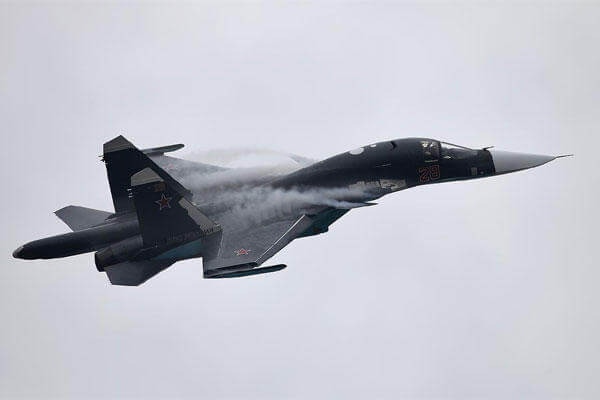On the first day of the Mosul offensive in Iraq, a Russian fighter came close to colliding with a U.S. warplane in a "near miss" over northeastern Syria, U.S. military officials said Friday.
Air Force Lt. Gen. Jeffrey Harrigian, commander of U.S. Air Force Central Command, told NBC News that the nighttime incident Oct. 17 was a "near miss" but said he tended to believe the Russians' explanation that their pilot simply did not see the U.S. aircraft in the dark.
However, Harrigian said similar close calls between Russian and U.S. aircraft over Syria have increased in the past six weeks amid rising tensions between Moscow and Washington over Syria's civil war and now occur about every 10 days.
In a later statement on the incident, Air Force Central Command said that the Russian fighter was escorting a Russian surveillance aircraft and inadvertently flew across the nose of the U.S. aircraft.
The close call was the result of a "mistake" by the Russians and the U.S. believed that it was "fully unintentional," the statement said.
"The Russians cooperated by looking into the incident, calling back, and explaining themselves and their pilots actions as an error," it said.
In a separate briefing to the Pentagon, Air Force Col. John Dorrian, a spokesman for Combined Joint Task Force-Operation Inherent Resolve, said the Russian fighter came within a half-mile of the U.S. aircraft, but "we don't believe there was any nefarious intent" on the part of the Russians.
Dorrian did not name the types of aircraft involved, saying only that the Russian aircraft was a fighter and the U.S. plane was a "larger aircraft." He said the Russian fighter "passed close enough that the jet wash from that flight was felt within the larger aircraft," but "no one declared an in-flight emergency or anything of that nature."
Immediately after the incident, the Russians were contacted over the "deconfliction" hotline set up by the Russian and U.S. militaries to avoid close calls by aircraft on missions in the region.
Harrigian, speaking from a U.S. base in the Mideast, said that, in some cases, U.S. and Russian aircraft flying in close proximity are "not a big deal," but added, "I think it's important to recognize this one got our attention."
"We called the Russians about it and made sure they knew we were concerned," Harrigian said. "They didn't have the situational awareness to know how close some of our airplanes were."
When asked why the Oct. 17 incident wasn't disclosed until Oct. 28, Dorrian said, "There wasn't anybody playing 'I've got a secret.' "
He said Army Lt. Gen. Stephen Townsend, the task force commander, was immediately informed of the close call but did not feel that it merited being disclosed as a "breaking news event."
-- Richard Sisk can be reached at Richard.Sisk@Military.com.
Related Video:
Two Minute Brief: US - Russia Relations





























